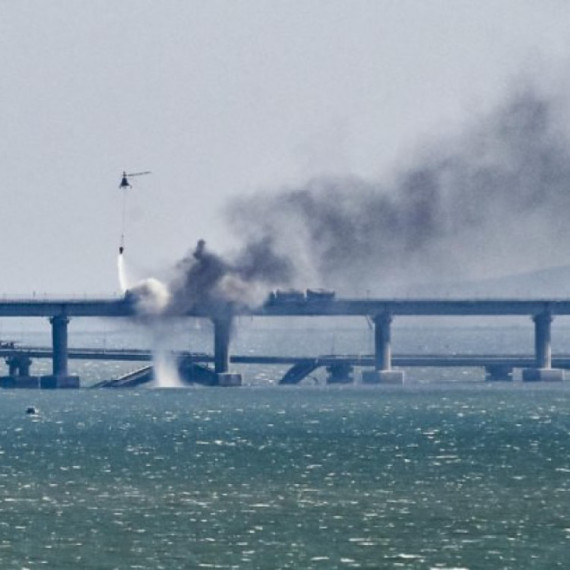EU nears Irish treaty compromise
EU leaders are finalizing guarantees to enable the Lisbon Treaty to win a "Yes" vote in a second Irish referendum.
Friday, 19.06.2009.
15:00

EU leaders are finalizing guarantees to enable the Lisbon Treaty to win a "Yes" vote in a second Irish referendum. Ireland is due to get legally-binding assurances that Lisbon will not affect Irish policies on military neutrality, taxes and abortion. EU nears Irish treaty compromise The EU is also expected to promise a "protocol" on the guarantees, to be attached to an EU treaty in future. On Thursday leaders backed Jose Manuel Barroso for a new term as president of the European Commission. They also agreed in principle to a new framework of rules to oversee the financial sector. Smoothing concerns The treaty has been ratified in most EU countries and the second Irish referendum - expected to be in October - is the biggest remaining hurdle. Irish Prime Minister Brian Cowen said fears that the EU might be able to override Irish policies were among the factors that prompted voters to reject the Lisbon Treaty in a referendum last year. The draft summit conclusions say the EU decision "gives legal guarantee that certain matters of concern to the Irish people will be unaffected by the entry into force of the Treaty of Lisbon". "This decision will not necessitate any re-ratification of the treaty," the draft says. Supporters of the treaty - a complex set of institutional changes aimed at making the enlarged EU more efficient - want to avoid any new round of referendums on it, after years of negotiations. Opponents of the treaty see it as part of a federalist agenda aimed at weakening national sovereignty. A proposal that the Irish "protocol" be added to Croatia's EU accession treaty appears to have been dropped, because Croatia's negotiations are in trouble. But attaching it to another EU treaty is not expected to raise legal difficulties. Sweden, the incoming holder of the EU presidency, is anxious to avoid any more delays over Lisbon, especially as Britain's Conservative Party has pledged to hold a referendum on the treaty if elected to government Financial concessions The EU leaders are expected on Friday to back a framework for enhanced oversight of the financial sector, after the UK won key concessions to the plans. The UK had opposed proposals to give a new oversight body the ability to order national governments to use taxpayer money to bail out failing banks. The draft summit conclusions say the European Council - the assembly of EU leaders - "stresses that decisions taken by the European Supervisory Authorities should not impinge in any way on the fiscal responsibilities of member states". The leaders want the European Commission to deliver detailed proposals for the new supervisory bodies by early autumn, so that the new framework will be in place next year. In another concession to the UK, a new European Systemic Risk Board will not automatically be chaired by the head of the European Central Bank (ECB). The ECB will still elect the chair, but the new body will not be controlled by the 16-nation eurozone. The board's job will be to spot any threats to financial stability across the EU. The leaders had the easier task of nominating the conservative Jose Manuel Barroso for a second term as EU Commission president. He had no rival - and even had backing from some center-left leaders. His nomination now needs the approval of the European Parliament next month. Barroso said on Thursday he was proud to have unanimous backing from the EU leaders.
EU nears Irish treaty compromise
The EU is also expected to promise a "protocol" on the guarantees, to be attached to an EU treaty in future.On Thursday leaders backed Jose Manuel Barroso for a new term as president of the European Commission.
They also agreed in principle to a new framework of rules to oversee the financial sector.
Smoothing concerns
The treaty has been ratified in most EU countries and the second Irish referendum - expected to be in October - is the biggest remaining hurdle.Irish Prime Minister Brian Cowen said fears that the EU might be able to override Irish policies were among the factors that prompted voters to reject the Lisbon Treaty in a referendum last year.
The draft summit conclusions say the EU decision "gives legal guarantee that certain matters of concern to the Irish people will be unaffected by the entry into force of the Treaty of Lisbon".
"This decision will not necessitate any re-ratification of the treaty," the draft says.
Supporters of the treaty - a complex set of institutional changes aimed at making the enlarged EU more efficient - want to avoid any new round of referendums on it, after years of negotiations.
Opponents of the treaty see it as part of a federalist agenda aimed at weakening national sovereignty.
A proposal that the Irish "protocol" be added to Croatia's EU accession treaty appears to have been dropped, because Croatia's negotiations are in trouble. But attaching it to another EU treaty is not expected to raise legal difficulties.
Sweden, the incoming holder of the EU presidency, is anxious to avoid any more delays over Lisbon, especially as Britain's Conservative Party has pledged to hold a referendum on the treaty if elected to government
Financial concessions
The EU leaders are expected on Friday to back a framework for enhanced oversight of the financial sector, after the UK won key concessions to the plans.The UK had opposed proposals to give a new oversight body the ability to order national governments to use taxpayer money to bail out failing banks.
The draft summit conclusions say the European Council - the assembly of EU leaders - "stresses that decisions taken by the European Supervisory Authorities should not impinge in any way on the fiscal responsibilities of member states".
The leaders want the European Commission to deliver detailed proposals for the new supervisory bodies by early autumn, so that the new framework will be in place next year.
In another concession to the UK, a new European Systemic Risk Board will not automatically be chaired by the head of the European Central Bank (ECB).
The ECB will still elect the chair, but the new body will not be controlled by the 16-nation eurozone. The board's job will be to spot any threats to financial stability across the EU.
The leaders had the easier task of nominating the conservative Jose Manuel Barroso for a second term as EU Commission president.
He had no rival - and even had backing from some center-left leaders. His nomination now needs the approval of the European Parliament next month.
Barroso said on Thursday he was proud to have unanimous backing from the EU leaders.










































Komentari 3
Pogledaj komentare